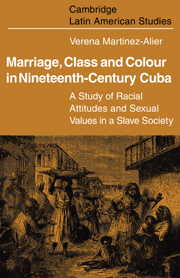 Marriage, Class and Colour in Nineteenth Century Cuba
Marriage, Class and Colour in Nineteenth Century Cuba Published online by Cambridge University Press: 09 October 2009
INTERMARRIAGE IN LAW
In 1776 the Spanish Crown enacted a Pragmática Sanción aimed at preventing unequal marriages resulting from the allegedly ill-understood freedom of marriage. Parental consent to marriage was made a formal requirement for those under twenty-five years of age and/or living under parental tutelage. Parental dissent was deemed justified when it was thought the proposed marriage would ‘gravely offend family honour and jeopardize the integrity of the State’.
In 1778 the Royal Pragmatic on marriage was extended to the overseas possessions in view of the ‘same or greater harm done there by such unequal marriages on account of their size and the diversity of classes and castes of their inhabitants’, and ‘the very severe damage done by the absolute and indisciplined freedom with which these passionate and incapable youngsters of both sexes betroth themselves’. The penalty for infraction of the law was disinheritance. Nevertheless, its enforcement in the colonies seems to have met with considerable difficulties. The clergy inquired repeatedly about cases where couples were willing to forfeit their inheritance and where ‘reasons of conscience’ were pleaded as a ground for marriage. In the colonies the threat of disinheritance was surely not a very effective one. Many who had migrated to America had done so because there was nothing to be had at home, and the property they had been able to acquire there was often rather meagre: ‘the number of poor parents … being large, their sons mind very little about losing the hope of inheriting from them’, commented one official.
To save this book to your Kindle, first ensure no-reply@cambridge.org is added to your Approved Personal Document E-mail List under your Personal Document Settings on the Manage Your Content and Devices page of your Amazon account. Then enter the ‘name’ part of your Kindle email address below. Find out more about saving to your Kindle.
Note you can select to save to either the @free.kindle.com or @kindle.com variations. ‘@free.kindle.com’ emails are free but can only be saved to your device when it is connected to wi-fi. ‘@kindle.com’ emails can be delivered even when you are not connected to wi-fi, but note that service fees apply.
Find out more about the Kindle Personal Document Service.
To save content items to your account, please confirm that you agree to abide by our usage policies. If this is the first time you use this feature, you will be asked to authorise Cambridge Core to connect with your account. Find out more about saving content to Dropbox.
To save content items to your account, please confirm that you agree to abide by our usage policies. If this is the first time you use this feature, you will be asked to authorise Cambridge Core to connect with your account. Find out more about saving content to Google Drive.